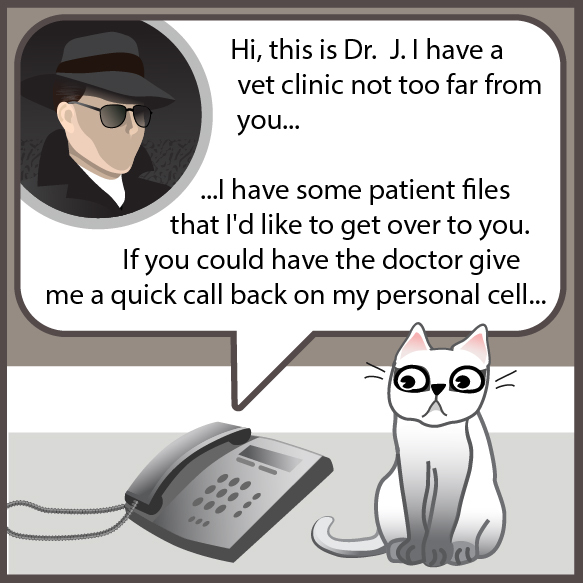Who is 'Dr. J' and what does he want?
 Listen to this story.
Listen to this story.
shady phone call

The messages usually are left outside of business hours, often in the middle of the night. A caller identifying himself as "Dr. J" says he is about to retire and would like to transfer patient records. He asks for a return call and leaves a local number.
This call has been made to veterinarians in California, Florida, Iowa, Maryland, Texas, Washington, Wisconsin and elsewhere — in short, all over the country.
The weird thing is that veterinarians who return the call report that they invariably get a recording. And if they leave a message, no one calls back.
"What I don't get is, what's the purpose of this?" wondered Dr. Laurie Swanson, an Illinois practitioner who fielded one such call. "It doesn't scare anyone, there isn't any money in it, so what is the point???"
Swanson posted her rhetorical question recently on a message board of the Veterinary Information Network, an online community for the profession. She's one of 34 veterinarians to report in the online discussion that they've been called.
Dr. Ryan Millington, a veterinarian in Austin, Texas, started the message board discussion titled What's this scam? in late October after receiving a second call from Dr. J. The first one, he said, came four or five months ago at 3 a.m.
Millington said he's familiar with almost all of the veterinarians in his area, and none is a Dr. J. He also didn't understand why the guy would call in the middle of the night. Nevertheless, Millington returned the call.
"I ... left a msg stating I'll be happy to see his clients, and if there are any specific cases you'd like [to] apprise me of, give me a call. Otherwise you can just give your clients our number and clinic info. We are gladly accepting new clients," Millington wrote. No one responded.
Then Dr. J called Millington's office phone again, once again in the wee hours, repeating the original message.
"Obviously, this is some sort of scam. But what is it?" Millington wanted to know. "The only thing I can think of is if he gets on the phone with me, he hopes he can talk me into giving him access to our software to make a 'large transfer of patient records' and then somehow use that data however hackers like to use personal data that is stolen."
Another veterinarian speculated that the caller is trying to harvest audio recordings. "Maybe not a good idea to leave a voice mail. Today, they can also steal our voices and use them for more scams," said Dr. Adam Polosetski, a veterinarian in San Diego, alluding to artificial intelligence tools that enable bad actors to "clone" voices for nefarious purposes.
The U.S. Federal Trade Commission has warned of voice cloning. In a March 20 consumer alert, it said scammers use AI to mimic voices of relatives purportedly calling for help in an emergency.
However, the Dr. J jig isn't necessarily in the same category, according to staff at the FTC's Bureau of Consumer Protection. Asked whether the caller might be trying to lure recipients to leave voice recordings, bureau staff replied by email:
"This seems unlikely. The [outgoing] voicemail message of the receiver is probably as good of an audio sample as whatever message the receiver would leave for the caller."
FTC staff, whose response was conveyed by a media representative, indicated that the agency was unfamiliar with Dr. J-style calls and did not know what such a caller might be trying to achieve.
Regarding the caller not responding to those who return his call, FTC staff offered, "It is possible that the original caller is blasting calls indiscriminately and isn't answering all of the returned calls."
They said suspicious calls can be reported to https://reportfraud.ftc.gov.
Similarly, the federal Consumer Financial Protection Bureau didn't have knowledge of or insight into the Dr. J calls. Generally, said CFPB spokesperson Raul Cisneros, "Consumers should be cautious when they receive unsolicited calls and especially if it involves any sort of financial transaction."
Pointing to CFPB materials online about how to protect against fraud and scams, he added, "Consumers should never share any personal, financial or account information unless they know it's a trusted or verified source."
Judging from the agencies' responses, call recipients who haven't embarked on a financial transaction with the caller appear not to have put themselves at risk — not any known risk, anyway. But the calls can be a nuisance, and not just for the receivers.
Dr. Victoria Caccavone, a veterinarian in Florida, said after she received a Dr. J call, she scouted her area for a colleague with that name. She found one who goes by Dr. Jay — using his first name after the title — and gave him a ring.
"[H]is office was kind enough to let me know that they have gotten calls from other vets that have received the scam call," Caccavone wrote on the VIN message board. "They had absolutely no idea about it!"
Although she didn't get to the bottom of the mystery, Caccavone found comfort in knowing she wasn't alone. "Glad to hear it's not just us," she said.